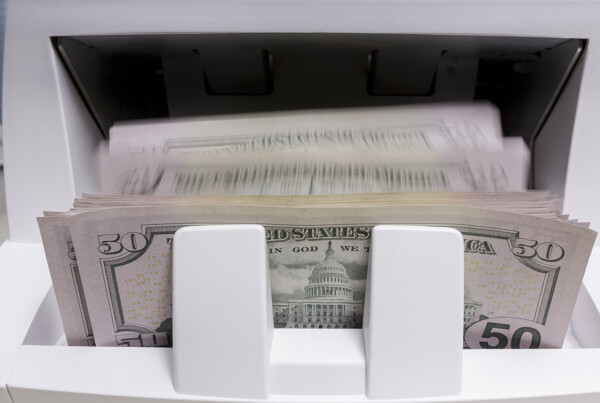How You Can Prepare for Rising Interest Rates and Inflation
For the first time in a long time, rising interest rates and inflation are in the news. For many, this can impact one’s financial quality of life as affording usual comforts becomes increasingly more expensive.
How Are Interest Rates Rising in Recent Years?
In 2021, we saw a massive amount of inflation for the first time in years. Consumer prices jumped 2.6% in March, the biggest increase since August of 2018. Last month, the 10-year Treasury yield hit 1.75%. While the benchmark bond’s yield has since retreated to near 1.6%, it’s still well above its .5% level of August 2020.
Should You Be Worried About This?
Headlines about rising inflation and interest rates may seem scary to some. This could be due to the fact that both inflation and interests rates have been so low for so long.
Hyperbolic headlines don’t help. Instead of stirring up sensation, we decided to cut through the noise and give you an informed perspective. Today, we’re going to present our view on inflation and rising interest rates as well as what actions, if any, that you should take.
What’s Spurring Inflation?
First, let’s look at what’s causing the pickup in inflation. In a word, demand for goods and services is rising faster than supply. In turn, this is causing prices to rise.
What is driving consumer demand right now? Vaccinations, business reopenings, trillions of dollars in federal stimulus spending, and ample consumer savings are the most prominent examples that come to mind.
Due to the COVID-19 pandemic, many businesses that rely on global supply chains have faced hurdles in obtaining the materials they need to manufacture their products at a pre-pandemic scale. This means that many consumer goods are available in shorter supply, despite the demand remaining high.
In an attempt to meet consumer demand as much as possible, businesses have to expend more time, money, and resources on both finding alternative ways to stock enough of their products as well as meeting any new pandemic-related compliance requirements. These contribute to rising costs as well.
When Will 2021 Inflation End?
Economists in the media cannot completely agree on when this inflation period will end. However, because it is largely tied to supply chain woes, we can make a few assumptions:
- As long as manufacturers and retailers struggle to meet the high consumer demand for products, inflation will likely continue.
- However, as the world continues to return to normal and the economic impacts of the COVID-19 pandemic wane, we could expect that the inflation rate will start decreasing again once damaged supply chains start to recover and businesses can sell more of their products to their customers.
Do Interest Rates Rise with Inflation?
Inflation can directly impact falling or rising interest rates. Bond investors keep an eagle eye on inflation because rising prices eat into the purchasing power of bonds’ fixed interest payments.
As bondholders sell, bond prices readjust downward. And that drives up yield—which is the amount of interest a bond pays relative to its price.
Long-term yields, in turn, are used as a benchmark by mortgage lenders. As yields rise, lenders raise the interest rates they charge borrowers.
This is where you might feel the impact. Interest-rate increases of just a point or two can significantly affect both monthly payments and total payments over a loan’s lifetime. To furnish these costs, the burden ultimately falls to the borrower.
A borrower with a $500,000, 30-year mortgage at 2.75%, for example, will pay $2,041 per month and $734,834 over the life of the loan. For the same loan with an interest rate of 3.75%, the borrower will pay $2,316 per month and $833,608 total – meaning that a single extra percentage point of interest adds nearly $100,000 to the cost of the loan. On a month-to-month basis, the browser would then be paying $3,300 per month – nearly a thousand dollars more.
Does this Indicate a Long-Term Trend?
So far, inflation and interest rates are still historically low. Some Federal Reserve officials expect the pickup in inflation to be transitory.
Still, this is an opportune time to evaluate real estate purchases. Instead of buying at a time with immense rising interest rates, it might make more sense for you to hold out and see which direction the real estate market is heading in the near future.
This is where a financial advisor can assist you in making the soundest decision for your situation. They will help you better understand the impact of buying versus waiting, how a mortgage fits within your budget, and how payments can affect your financial plans.
It’s important to understand that rates on home-equity loans may not rise in tandem with mortgage rates. That’s because home-equity rates are geared to short-term rates controlled by the Fed, and the central bank has signaled it will keep such rates low indefinitely.
How Does This Affect My Stocks?
Rising bond yields can also stir up stock market volatility. Stock prices, in general, have remained high following the market’s 2020 runup. The more robust yields on safe Treasury bonds have also caused a certain number of investors to sell stocks and buy bonds.
As stocks trade down, opportunistic equity buyers smell bargains and snap them up. The result: markets rise and fall from one day to the next.
What Are the Best Investments for Rising Interest Rates?
There is no single “best” investment that any one investor can make. Some degree of risk can still be associated even with what feels like a “foolproof” asset. When the market grows more volatile, having a well-diversified portfolio can play a critical role in weathering the economic storm.
The Value of a Diversified Portfolio
Putting all of your economic eggs in a single basket poses the greatest investment risk of all. If the primary asset in your portfolio drops in value, how do you compensate? When your portfolio covers a broad range of diverse assets, you can create a stronger hedge against inflation.
Volatile markets underscore the value of diversified investment portfolios, like those that we create at AdvicePeriod. Diversified portfolios comprise a mix of asset types to capture market returns while limiting exposure to any single asset or risk.
Why Every Investor Should Diversify Their Portfolio
By diversifying one’s portfolio, we don’t mean jumping from asset to asset and accumulating a wide variety of exotic alternative investments. Instead, we promote taking an informed, deliberate, and calculated approach to expanding your money’s influence. Diversification has been proven to produce higher long-term returns and greater protection against risk than isolated individual investments.
Should I Invest in Trendy New Assets?
Trendy investments enter the marketplace on a regular basis. Today, NFTs and cryptocurrencies are dominating headlines. Tomorrow, will something else emerge and take their place?
When markets like crypto are still maturing, there is often more risk and volatility associated with them. Unlike legacy markets that have decades of data behind them, new investment concepts require a greater comfort level with assuming a larger amount of risk.
This does not mean that you should avoid these types of investments entirely, but when the market is facing a period of uncertainty, the risk is your worst enemy. By diversifying your portfolio, you can protect your money against the impacts of inflation and ensure long-term returns that will continue to generate benefits long after the latest fad has passed.
Our Solution for Rising Interest Rates and Inflation
At AdvicePeriod, we complement your portfolio diversification with regular rebalancing. We focus on adjusting the mix of holdings in your portfolio to remain in line with your investment goals and risk tolerance.
Rebalancing can further reduce portfolio volatility and can potentially increase returns over time. So when it comes to investing, if your goals and risk tolerance have remained the same, the best thing to do might be to do nothing. We’ll help you build a reliable portfolio that you can trust with confidence.
Start Building a Stronger Portfolio Today
When the markets face volatile periods of uncertainty, building a stronger portfolio can ensure promising returns while reducing risk. In a period of staggering rising interest rates and inflation, now has never been a better time to start building a strategy to weather the economic storm.
If you’re looking to reduce risk with your own portfolio, we are here to help. Don’t hesitate to contact your financial advisor to discuss investments, mortgages, or any other financial topic.




